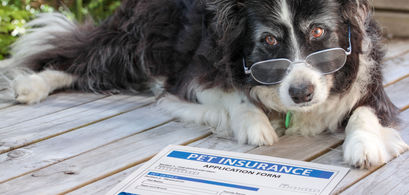To many families, a pet can bring love, companionship, and security to a home. With this relationship comes a responsibility on behalf of the owner to provide for their pet's proper veterinary care; whether it's a routine checkup or an emergency. Purchasing a pet insurance policy can oftentimes help ease that financial burden.
In this article, we're going to talk about two types of insurance that all pet owners should seriously consider: health insurance, and liability insurance. We're also going to discuss each type of policy separately, and for a very practical reason. Liability insurance is often included as part of a homeowners insurance policy. Pet health care insurance carriers specialize in the medical care / veterinarian segment of the insurance industry.
Pet Health Insurance
Regardless of whether a pet was purchased from an expert breeder or adopted from a local center, all animals should see a veterinarian for an initial examination. These initial visits can run anywhere from $70 to $300 depending on geographic location, and the extent of the medical services provided.
Many pets will also require regularly scheduled follow up visits to a veterinarian as part of a well-care program that includes vaccinations, immunizations, as well as routine medical examinations. The point here is the cost of providing routine pet health care can be a significant expense. If we add to this the unplanned costs that can occur from accidents and illnesses, then it's even clearer why there is a steady and growing demand for health insurance that covers pets.
Health Care Coverage
To protect themselves from the high cost of medical care, many owners are turning to pet health insurance plans or pet health care coverage. These insurance plans cover both the costs of routine health care examinations as well as the cost for medical care administered due to illness.
Typical health care coverage contained in this type of insurance policy includes:
Routine and emergency veterinarian office visits
Pet hospitalization
Prescription medications
Diagnostic medical tests
X-ray examinations
Surgeries
Heartworm protection
Spaying and neutering
Laboratory fees
Vaccines and immunizations
Selecting a Pet Insurance Policy
Whenever buying insurance, it's important to read all the fine print when comparing policies. As is the case with other types of insurance, pet health care policies typically include:
Annual Spending Caps: while some health care policies carry lifetime maximums, or caps on payments made, pet insurance often carries annual spending caps.
Deductibles and Copayments: pet insurance typically comes with deductibles or copayments that are higher than those families might be used to seeing with an HMO. For example, insurance carriers may charge deductibles in the area of $50 per visit.
The best insurance carriers will clearly spell out the terms and conditions of the policies they have to offer. Make sure the details of any policy are completely understood before paying any monthly premiums.
Pet Health Care Insurance Cost
Anyone that thinks pet health care insurance is too expensive might be pleasantly surprised to find the monthly premiums are very reasonable. A quick stop to VPI pet insurance allowed us to obtain health insurance quotations for both a dog and a cat.
Example
Costs will vary according to the plan selected, but typical health insurance premiums for a dog will be around $56 per month, while health care insurance premiums for cats are in the range of $34 per month.
Keep in mind these premium quotes are for what's assumed to be a relatively young and healthy dog or cat. It may be expensive or impractical to obtain health care insurance for animals with pre-existing health conditions.
Pet Liability Insurance
The second type of pet insurance we're going to discuss has to do with liability protection. Every pet owner, especially dog owners, needs to carefully consider purchasing liability insurance for several very good reasons.
The first and foremost reason for considering this type of insurance has to do with the simple fact that dogs do bite. Each year, nearly five million people in the U.S. alone are bitten by dogs. The liability payments associated with these accidents approaches one billion dollars annually.
The second reason for carrying this type of pet insurance is because it helps to protect those that are around the pet most frequently. That means protecting friends and relatives from the expense associated with a dog-related injury.
Finding Pet Liability Insurance
In the past, it was very easy to find pet liability insurance. Typical renters and homeowners insurance policies provided victims of dog bites with $100,000 in coverage. However, the insurance industry has been slowly moving away from providing this type of coverage automatically within a homeowners policy.
Today's new insurance policies may actually exclude bites and injuries caused by dogs, while other insurance carriers are beginning to eliminate this coverage from their existing policies. In addition, a more common tactic of an insurance carrier might be to identify certain breeds of dogs that have been associated with these types of injuries and exclude them from coverage.
The bottom line here is that pet owners, especially dog owners, should make sure their insurance policy provides them with the protection they need. Anyone that owns a dog, and their existing insurance policy explicitly denies this liability coverage, may want to give serious consideration to switching to an insurance carrier that will provide this coverage.
Finally, we're going to finish up with the same warning we gave earlier when talking about pet health care insurance policies. Read the policies thoroughly so there is a good understanding of what's covered, and what's not covered; don't get into a situation where an insurance claim is rejected by a carrier.





.jpg)